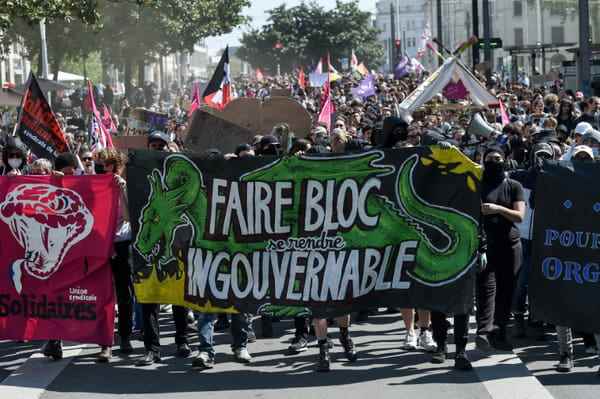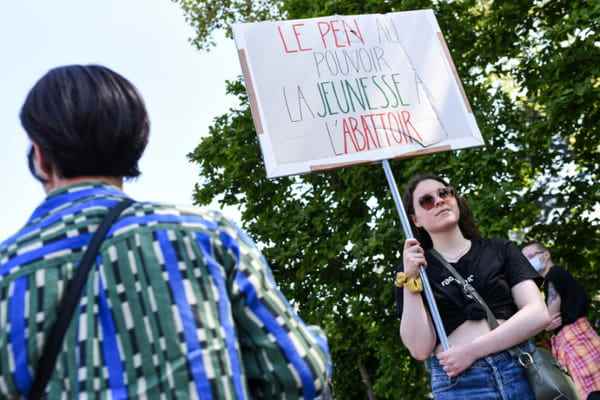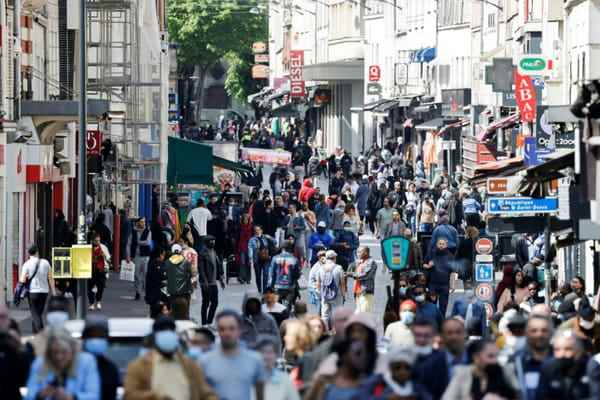Their heart beats very left. In 2017, in the second round of the presidential election in France, they gave their vote to Emmanuel Macron to block the leader of the far right Marine Le Pen. Five years later, they are disillusioned and faced with the same duel they hesitate.
The voters of the leader of the radical left Jean-Luc Mélenchon, who came third in the first round on April 10 (21.95% of the vote), are more than ever courted by the president-candidate, 44, former minister of a government socialist who presents himself as being neither of the right nor of the left.
But they come out of the five-year term cool.
“The last time, we had serious doubts but we said to ourselves that he was still from the left, liberal of course, but from the left,” said Zahra Nhili, a 42-year-old consultant. “There, we saw him at work, he is clearly on the right.”
In the first round, Zahra Nhili, met in a trendy bar in Nantes (west), voted like her city which placed the candidate of rebellious France in the lead.
Since then, she has heard the multiple calls made to block Ms. Le Pen, 53, in the second round on Sunday.
After the shock of April 21, 2002 and the surprise qualification of the extreme right for the first time in the second round of a presidential election, the tradition was established in France of a “republican front” of the major right-wing and left to prevent the nationalists from coming to power.

Demonstration against the far right and racism in Nantes, western France, on April 16, 2022
© AFP – Sebastien SALOM-GOMIS
But things have changed. In 2017, explains Zahra Nhili, she felt like she was doing her duty by slipping a Macron ballot into the ballot box. Today, she is not sure to do so.
“It’s catastrophic what he did, the poor got poorer, the rich got richer,” she said. “If at the very end we are told that (Marine Le Pen) can pass, we will vote Macron but my heart will suffer.”
– Crucial vote –
Jean-Luc Mélenchon’s voters represent some 7.7 million votes – not counting the 3.5 million given to ecologists, socialists, communists and other small far-left parties.
Even if the polls give Mr Macron a comfortable lead, their vote on Sunday will be crucial.
A survey carried out this week by Ipsos-Sopra Steria indicates that around a third of Mr Mélenchon’s voters will vote for Mr Macron. But only about half do not yet know what they will do.

Demonstration against raciosm and the far right in Nantes, western France, on April 16, 2022
© AFP – Sebastien SALOM-GOMIS
If the abstention or the votes for Marine Le Pen are ultimately higher than predicted by the polls, the battle will be closer between the president-candidate and the leader of the National Rally, who according to the latest surveys respectively collect an average of 54% and 46% of voting intentions.
“The left-wing electorate has the outcome of the second round in its hands,” said political scientist Jérôme Fourquet.
Interviews conducted by AFP journalists in the lands of rebellious France in recent days have revealed a feeling of indecision and disillusionment. They also showed a dislike of the president.
“I am opposed in everything to Emmanuel Macron”, explains Margot Medkour, leader of the left-wing movement “Nantes in common”. “He is not a bulwark on the far right, he has a very authoritarian exercise of power and a real contempt for people.”
However, she continues, “Marine Le Pen is not an alternative, I will get my hands dirty and vote for him”.
– “President of the rich” –
Margot Medkour’s remarks echo the grievances leveled by voters on the radical left against the incumbent president, a former investment banker at Rothschild propelled to power at 39 and who had never stood for election before.
His first year in power left its mark, when he lowered housing aid or abolished the wealth tax, which soon earned him the title of “president of the rich”.
His little phrases, like when he says to an unemployed gardener that he would only have to “cross the street” to find work, always have a bitter taste.

Graffiti on an election poster for Jean-Luc Mélenchon, candidate of the radical left, on April 9, 2022 in Paris
© AFP – JOEL SAGET
“He was very condescending. I understand that there are people who can’t vote for him,” said Chloé Dallidet, 36, worker, sipping a coffee in the central square of Foix (south-west). social.
In his department of Ariège, where unemployment is around 9% and where poverty was close to 18% in 2019, Mr. Mélenchon came out on top in the first round. “Here, if you cross the street, you can’t find a job,” says Gaëtan, a 36-year-old salesman.
The reputation of elitism still sticks to the skin of the president, even if since then he has lowered taxes for all and above all, abandoning his liberal clothes, opted at the height of the health crisis for massive social and economic aid which has made jump the deficit but allowed to keep companies and employees afloat.
Even the drop in unemployment to its lowest rate in 15 years earns him little recognition on the left.
“I’m fed up that the economy always comes before ecology”, says for example Antoine Marchand, 21, a medical student in Nantes.
Others have in mind the brutal methods used by certain members of the police during the revolt of the “Yellow Vests”, a social protest movement which seriously undermined the five-year term in 2018 and 2019 before withering away.
“I’m going to vote blank because I lived for five years under an authoritarian government,” Dominique Subra, a retired civil servant, told Foix.
Mr. Mélenchon asked his supporters not to give “a single voice to Mrs. Le Pen”. But, he did not call to support Emmanuel Macron.
– “Try” Le Pen –
On April 10, young people, environmentalists, civil servants or unionized workers overwhelmingly voted for Jean-Luc Mélenchon, 70, sometimes considered a French Bernie Sanders.
Just like the “red belt”, historical stronghold of the communists in the Paris suburbs. In Villetaneuse, a poor town in the north of the capital with a large Muslim community, he beat an absolute record with 65% of the vote.
“Everyone here found themselves in the program of Mélenchon”, assures Azdine Barkaoui, father of four children, seduced by his idea of taxing the rich more and his speech on multiculturalism.
Many in this city are not sure whether to vote, as they did en masse in 2017, for Mr. Macron, who proposes the gradual raising of the retirement age to 65 and the allocation under conditions of the Active Solidarity Income.
Mr. Barkaoui thinks to give his voice to Marine Le Pen who campaigned on the theme of the defense of purchasing power and retirement at 60 years old.
She promised to ban the veil from public space but “we know that she will not be able to put into practice most of her proposals on Islam”, assures this practicing Muslim.
For more than a decade Marine Le Pen has smoothed her speech to deconstruct what her father Jean-Marie Le Pen, founder of the National Front since renamed, had built with anti-Semitic or racist harangues, sometimes condemned in court. But basically “the national priority” will deprive foreigners of several benefits and its program on immigration has not changed.
“It’s like a dish that everyone says is bad but I want to try,” Barkaoui says.
All rights of reproduction and representation reserved. © (2022) Agence France-Presse

